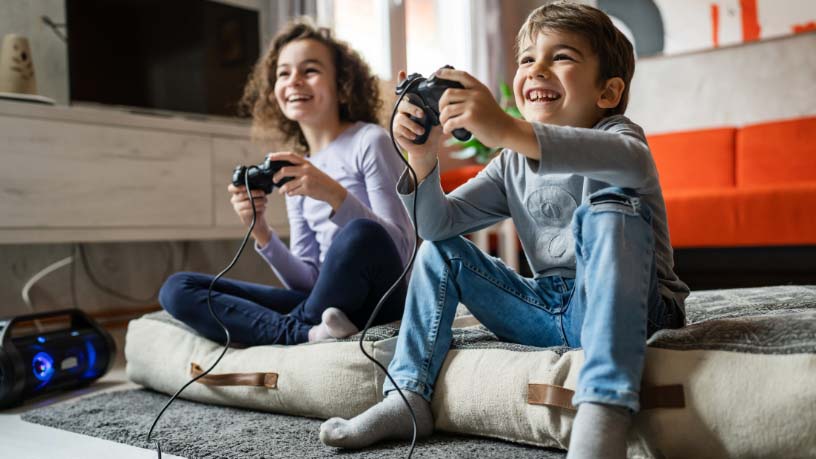Open communication is an important part of connecting with your teen.
Key takeaways
Encouraging honest conversations helps break down communication barriers.
Here, we look at ways to talk to your teen that’ll actually get through to them.
Long after the nappies, crying nights and endless tantrums have become a distant memory, the tween and teen years hit. Now, endless toddler chatter is replaced with one-word answers and grunts.
But keeping the lines of communication open is essential during this phase of your child’s life. Here, we look at ways to make sure you can have honest, loving and productive conversations with your tight-lipped teen.
The importance of open conversations
Good communication with your kids can help to lay the foundation for their healthy development.1
“Young people really want to connect and build a relationship with trusted adults,” says Hannah, Kids Helpline School Counsellor. “They’re seeking conversations where they can feel heard, valued and validated.”
How to encourage young people to talk
Conversations with young people can easily end up being mostly task-orientated. In other words, getting them to wake up, shower, help out with chores, and so on.
But, according to Hannah, communication with your child needs to be about more than just this.
“When parents are able to role model healthy communication, talking about needs, boundaries, hopes and fears, it can lead to deep connection and relationships,” she says.
Try asking them questions about things they’re interested in to show you care about their life.
[Two young boys stand in a photographic studio, one dances. Text appears on screen asking the boys questions that they answer to camera]
[Text on screen: Today we talk about how to have conversations]
Vihaan: Dance!
Anishwar: Yeah!
Vihaan: What’s your favourite colour?
[Off screen voice answers]
My favourite colour is aqua.
[Laughter]
[Text on screen: Wait… we’re meant to be interviewing you! How does talking about your feelings make you feel?]
Anishwar: Makes me feel…
Vihaan: …calmer?
Anishwar: Calm, yeah. Makes me, like, feel a bit more confident because I’ve already talked to an adult and now they know about it, so, yeah.
Vihaan: Sometimes you can even smile!
Anishwar: Yeah.
[Text on screen: Where do you like to have these conversations?]
Vihaan: If it were like a bad situation, I would go to school because there are lots of people that can help, or maybe you could even call Kids Helpline at home?
Anishwar: Yeah.
[Text on screen: What would you say to a friend who needs help with their emotions?]
Vihaan: Are you okay?
Anishwar: Are you okay, do you want me to help you, do you wanna come take a walk with me, ask what they want to do, and then, um, maybe…
Vihaan: Do you wanna call Kids Helpline together?
Anishwar: Yeah.
[Text on screen: Kids Helpline @ School has conversations like these with young people across Australia every single day. Learn more about our range of topics at school.kidshelpline.com.au]
Both: 1800 55 1800!
Talk less, listen more
It’s natural to be curious when someone is telling a story. And, just as naturally, you might find yourself interrupting them with thoughts or advice, maybe even without realising it.
“Sometimes, young people aren't after advice or for their parent to fix what’s going on,” says Hannah. “They just want someone to listen.”
“Ask them what they need right from the start of a conversation. ‘Would you like to just have a rant or a chat? How do you want this to look?’"
It can also help to wait until a pause or the end of their story before you ask further questions. “This will ensure they don’t feel interrupted or cut-off, as this can shut down conversation,” says Hannah.
Use open questions
“Asking open questions shows [your child] you’re really trying to understand,” says Hannah. “It allows for the young person to share in their own words what’s going on, who’s involved and what it feels like.”
Ask specific questions such as, “How did that test go?” And, to keep the chat flowing, something like, "What happened next?".
Allow silence
Silence can be a powerful communication tool.
“Silence allows the speaker to have the time to piece together their story and tell it at their own pace and in their own way,” says Hannah. “It can provide a space for you both to be present before you move into the next phase of the conversation.”
Reflect and summarise
Reflecting on and summarising the main points of your conversation can create space to ensure that you and your child have understood each other.
“Allow space and opportunity for them to correct you or re-tell what the key part was for them,” says Hannah.
What to do when your child doesn't want to talk
It’s normal for teens to assert their independence and seek out privacy. But how do you get them to open up when you think there’s something wrong?
According to Hannah, it’s important to strive for an open, non-judgmental environment where your child feels safe to discuss their thoughts and concerns.
Timing
Do you have the capacity to talk right now, without distractions or knowing you’ll need to rush off somewhere?
Tone
A judgemental tone may put your child on the defensive.
“Are you starting the conversation with a neutral and curious tone, or are you coming in with pre-conceived ideas or judgement?” asks Hannah.
Body language
“Open and relaxed body language can help someone feel relaxed and comfortable,” says Hannah. “Crossed arms, or sitting directly across from someone, can potentially make them feel they are being interrogated.”
Location
Your physical environment can make a difference during important conversations.
For instance, “conversation may flow more easily when you do an activity together, which can reduce the pressure,” says Hannah.
How to avoid a communication breakdown
“Conversation is a 2-way street that’s built upon mutual understanding and the ability to share and be listened to,” says Hannah.
Instead of shutting a conversation down, it may help to allow your teen to offer up their ways to resolve it. Then, you can work together to come to an agreement.
“A breakdown of communication can occur if someone is not feeling heard or listened to, or if they’re feeling pressured to continue a conversation they’re not wanting to,” Hannah adds.
“Checking in is a great way to avoid a breakdown in communication. Ask, ‘Do you want to keep talking about this now?’. This type of language puts the control in their hands. It can also help build trust, lead towards open conversations, deepen relationships and help them feel that their needs are being considered.”

At Bupa, trust is everything
Our health and wellbeing information is regularly reviewed and maintained by a team of healthcare experts, to ensure its relevancy and accuracy. Everyone's health journey is unique and health outcomes vary from person to person.
This content is not a replacement for personalised and specific medical, healthcare, or other professional advice. If you have concerns about your health, see your doctor or other health professional.
1 Victoria State Government. (2023). Conversation and social skills. Victoria State Government.
You might also like...
Bullying: A guide for parents and carers
It’s hard to know what to do when your child is being bullied, or how to recognise the signs in the first place. Check out this guide for some helpful tips.
How to talk to your kids about social media
Social media is a daily part of our kids’ lives, whether we like it or not. So, what are the risks and benefits, and how can we keep our kids safe online?
Sleep solutions for tired teens
If your teenager is staying up late and wanting to sleep the day away, you’re not alone. Discover some potential sleep solutions for tired teens.
Friendships: The importance of healthy boundaries
We spoke to a psychologist to find out why it’s important for children to make friends and how you can help them set boundaries in their relationships.





